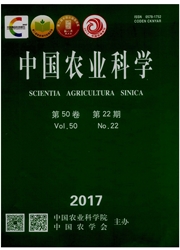

 中文摘要:
中文摘要:
【目的】探索AM真菌与外源水杨酸SA提高植物耐盐性的协同效应。【方法】于温室盆栽条件下试验了丛枝菌根(AM)真菌摩西球囊霉(Glomus mosseae)和外源SA对草莓(Fragaria×ananassa Duch.品种:哈尼)耐盐性的影响。【结果】接种摩西球囊霉、施加外源SA、或接种摩西球囊霉+SA处理都能显著增加草莓植株叶片和根内K和叶绿素含量、降低Na和丙二醛的含量,而以G.m+SA处理效果最佳。NaC l6g·L^-1胁迫下,接种摩西球囊霉和外源SA处理能显著提高草莓叶片SOD、POD和CAT酶活性、促进植株生长。接种AM真菌配合外源SA处理提高草莓耐盐性的效果最明显。【结论】在一定条件下接种AM真菌配合施用外源SA能协同提高植物耐盐性。
 英文摘要:
英文摘要:
[Objective] The synergic effect of arbuscular mycorrhizal (AM) fungi and exogenous salicylic acid (SA) on increase of salt-tolerance of strawberry plants was explored. [Method] Pot experiments in greenhouse were carried out with strawberry (Fragaria×ananassa Duch cv. Hanie) plants inoculated with AM fungus (Glomus mosseae) and treated with exogenous SA. [ Result] The leaf chlorophyll and K contents in leaves and roots were significantly increased, but the content of malondialdehyde was reduced in strawberry plants treated with G. mosseae, exogenous SA, or G. mosseae+exogenous SA, while the latter showed the best beneficial effects. Under the stress with NaC1 6 g·L^-1, G. mosseae and exogenous SA could significantly enhance SOD, POD and CAT activities in strawberry leaves and plant growth. The treatment with G. mosseae and exogenous SA showed the best benefits in increasing salt tolerance of strawberry plants. [ Conclusion] It is concluded that AM fungal inoculation with SA application could synergically enhance salt-tolerance of plants.
 同期刊论文项目
同期刊论文项目
 同项目期刊论文
同项目期刊论文
 期刊信息
期刊信息
